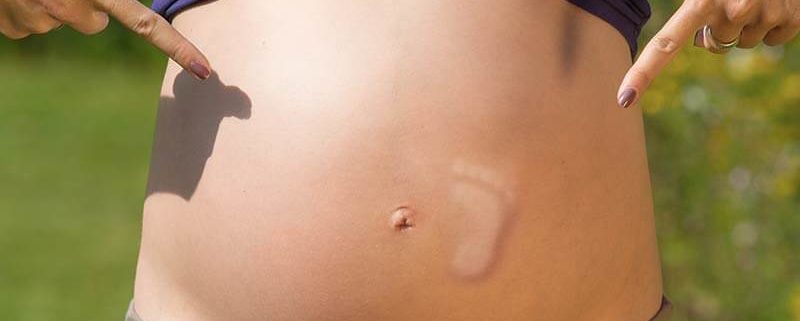Baby Kicks in the Womb
One of the most exciting moments in your pregnancy is when you feel those first little flutters of your baby kicking. These tiny movements reassure you that your baby is developing and help you feel closer to the little life inside of you.
Though the womb is a tight space in which to exercise, it turns out that those kicks are vital for the baby’s healthy bone and joint development.
Feeling a baby moving and kicking in the womb might be a weird sensation, but it’s simply a sign of healthy development.
Fetuses begin moving in the womb about as early as 7 weeks, when they slowly bend their necks, according to a review paper published in the journal Ultrasound in Obstetrics & Gynecology. As the babies grow, they gradually add more movements to their repertoires, such as hiccupping, arm and leg movements, stretching, yawning, and thumb sucking. But the mom won’t feel the bigger movements such as kicks and punches until 16 to 18 weeks into her pregnancy when the baby is a bit stronger.
What Does the Baby’s Kicking Feel Like?
Pregnant women describe their baby’s movements as butterflies, nervous twitches, or a tumbling motion. At first, it may be hard to tell whether your baby has moved. Second- and third-time moms are more adept at distinguishing those first baby movements from gas, hunger, and other internal motions.
By your second and third trimesters, the movements should be more distinct, and you’ll be able to feel your baby’s kicks, jabs, and elbows. Babies in the womb are doing more than just kicking. By 15 weeks, the baby is also punching, opening and closing its mouth, moving its head, and sucking its thumb. A few weeks later, the baby will open and close its eyes. But the mother will feel only the major movements: kicking, punching and maybe big hiccups.
How Often Should I Feel My Baby Moving?
Babies tend to move more at certain times of the day as they alternate between alertness and sleep. They are usually most active between 9 p.m. and 1 a.m., right as you’re trying to get to sleep. This surge in activity is due to your changing blood sugar levels. Babies also can respond to sounds or touch, and may even kick your partner in the back if you snuggle too close in bed. Studies show that by the third trimester, the baby moves about 30 times each hour.
Should I Count My Baby’s Kicking? 
If you are counting, it helps to chart your baby’s kicks so that you can keep track of your baby’s normal patterns of movement. To count movements, pick a time when your baby is usually most active (often, this is right after you’ve eaten a meal). Get into a comfortable position either sitting down in a comfortable chair or lying on your side.
Opinion varies as to how to count your baby’s movements, but the American College of Obstetricians and Gynecologists recommends noting the time it takes for your baby to make 10 movements. You should feel at least 10 movements within a two-hour period.
Counting your baby’s kicks (and jabs and rolls!) is important because a change in movement in the third trimester is often the earliest sign of distress in a baby. When moms know what is normal for their baby, then they are more alert to potential red flags. We frequently hear from moms whose babies were saved because they noticed a change in their baby’s movement pattern and alerted their healthcare provider.
One study, published in 2001 in the journal Human Fetal and Neonatal Movement Patterns, found that boys may move around more in the womb than girls. The average number of leg movements was much higher in the boys compared to the girls at 20, 34 and 37 weeks, that study found. But the study’s sample size was small, only 37 babies, so Nowlan and her colleagues are hesitant to claim there’s a relationship between gender and fetal movement.
What if You Don’t Feel Your Baby Moving
If you haven’t yet reached 25 weeks and don’t feel your baby move, or you’re not sure that what you’re feeling is actually your baby, don’t panic. As your baby grows, you’ll be able to better distinguish his or her movements. You’ll also figure out at what times of the day your baby is most active. Some babies just naturally move less often than others.
A lack of movement also may mean that your baby is asleep. You may feel fewer kicks and jabs after the 32nd week as your baby gets bigger and has less room to move around in the uterus.
If you notice less movement during the day, Study suggests drinking a large glass of juice or a high-sugar drink and lying on your left side in a comfortable and quiet location. There is a good chance the baby will move with a sugar and hydration boost and wait for two hours to see if your baby’s movement becomes noticeable.
If your baby still doesn’t move within that two-hour period, you may contact your health care provider or obstetrician. You may get an ultrasound to make sure the amniotic fluid around the baby is normal and the baby’s muscle tone and reflexes are present. Your doctor may also put you on a heart monitor to carry out the ultimate test for your baby’s well-being.
Timeline of Baby Movement
Here is a guide to your baby’s possible movements.
Week 12: Your baby should start to move, but you probably won’t be able to feel anything, because the baby is still so small.
Week 16: Some pregnant women will start to feel tiny butterfly-like flutters. The feeling might just be gas, or it might be the baby moving.
Week 20: By this point in your baby’s development, you may start to really feel your baby’s first movements, called “quickening.”
Week 24: The baby’s movements are starting to become more established. You might also begin to feel slight twitches as your baby hiccups.
Week 28: Your baby is moving often now. Some of the kicks and jabs may take your breath away.
Week 36: Your uterus is getting crowded as the baby grows, and movements should slow down a bit. However, alert your healthcare provider if you notice significant changes in your baby’s usual activity. You should feel consistent movement throughout the day.
Resources:
https://www.webmd.com/baby/fetal-movement-feeling-baby-kick#1




Leave a Reply
Want to join the discussion?Feel free to contribute!